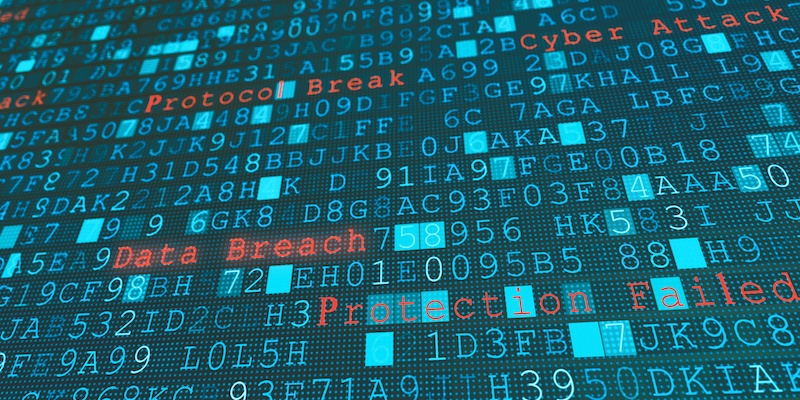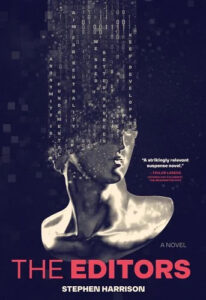When I ask crime fiction fans about their favorite books, they usually mention stories focused on traditional crimes, that is, the crimes recurring in the genre. Most often that’s murder mysteries, but occasionally I hear recommendations for books involving theft, kidnapping, or government corruption. One category of criminal activity, though, is rarely mentioned: cybercrime. So far, nobody has told me that their favorite book involves a bad actor wreaking havoc with a computer.
Of course this anecdotal evidence doesn’t necessarily mean that hacking, malware, online stalking, cyberterrorism, and other nefarious online activities never make an appearance. On occasion, these themes crop up in crime fiction, typically in the hybrid techothriller genre. But by and large, mysteries seem more comfortable handling cleavers than keyboards. Scanning through the list of recent bestsellers in crime fiction, cybercrime scarcely shows up. (There are, however, multiple titles featuring serial killers, Satanic blood rituals, and the theft of rare books.)
The internet is now ubiquitous in our lives, so why does it appear so rarely in popular literature?
At first glance, one might attribute the lack of cybercrime in novels to mere timing. After all, crafting a novel is a laborious process that can take years, and it’s plausible that many authors have yet to devise ways to seamlessly incorporate the digital world into their narratives. However, this argument falls short upon closer examination. The World Wide Web was made available to the general public back in 1991. Authors have had three decades to grapple with the technological shift. Groundbreaking writers like William Gibson were already portraying technology-related crimes in their works—not only hacking but also malevolent A.I.—as early as 1984 with his iconic book Neuromancer. The truth is, authors and readers have had more than sufficient time to adapt to the changing landscape of technology in literature.
The lack of computer crime in modern fiction could be also explained as an issue of anticipated market demand. Take the example of The Thursday Murder Club, a charming (and bestselling) mystery series about old people who live together in a retirement village solving crimes. Would a novel about a group of seniors thwarting cyber attacks sell just as many copies? Not likely. But why?
Readers may perceive cybercrimes as less intense or lacking dramatic appeal. A detective uncovering a computer virus does not have the same visceral impact as stumbling upon a gruesome murder. But the 2023 internet crime report reflects the harsh reality—countless people have lost their life savings due to cyber fraud, crypto scams, and hacking. And while the FBI is known in crime fiction for tracking serial killers, they are now sounding the alarm on foreign countries such as Iran and China, whose attacks threaten to bring down the entire power grid. The threat of cybercrime is real and must not be underestimated.
Finally, authors may balk at including computer crime because of its technical complexity. Then again, one of the great advantages of writing fiction is the ability to control the amount of detail revealed to readers. Dan Brown’s Digital Fortress does not explain the intricacies of the NSA’s code-breaking technology; instead, it simply establishes its existence and uses it to create a gripping narrative. And remember that some readers actually enjoy a level of technical complexity in their fiction when it helps to draw them into the narrative. Take the success of Andy Weir’s The Martian, which gained a devoted following due to its detailed scientific explanations and realistic problem solving. Perhaps crime fiction authors should turn their magnifying glasses on their speculative fiction colleagues.
At the end of the day, I suspect the main reason computer crime is largely absent from popular fiction is actually somewhat sad: Readers spend so much of their lives interacting with emails and screens, and they read books in part because they’d like to escape from the stress of the digital world.
But it’s important to remember that we read stories not purely for escapism but to explore issues of right and wrong. As famed crime writer James Ellroy once said, “The crime novel is the great moral literature of our time.” In today’s world, where so many moral challenges are intertwined with technology, ignoring computer crime in literature would be a grave mistake. Not only that, incorporating the internet is a more honest portrayal of modern life, reflecting how often technology mediates the human experience, including its darker elements. After all, today’s stalkers use Instagram, and TikTok fame has led to deadly consequences. By integrating technology, crime authors can elevate the moral significance of their work while also adding a gritty dose of realism.
***


















